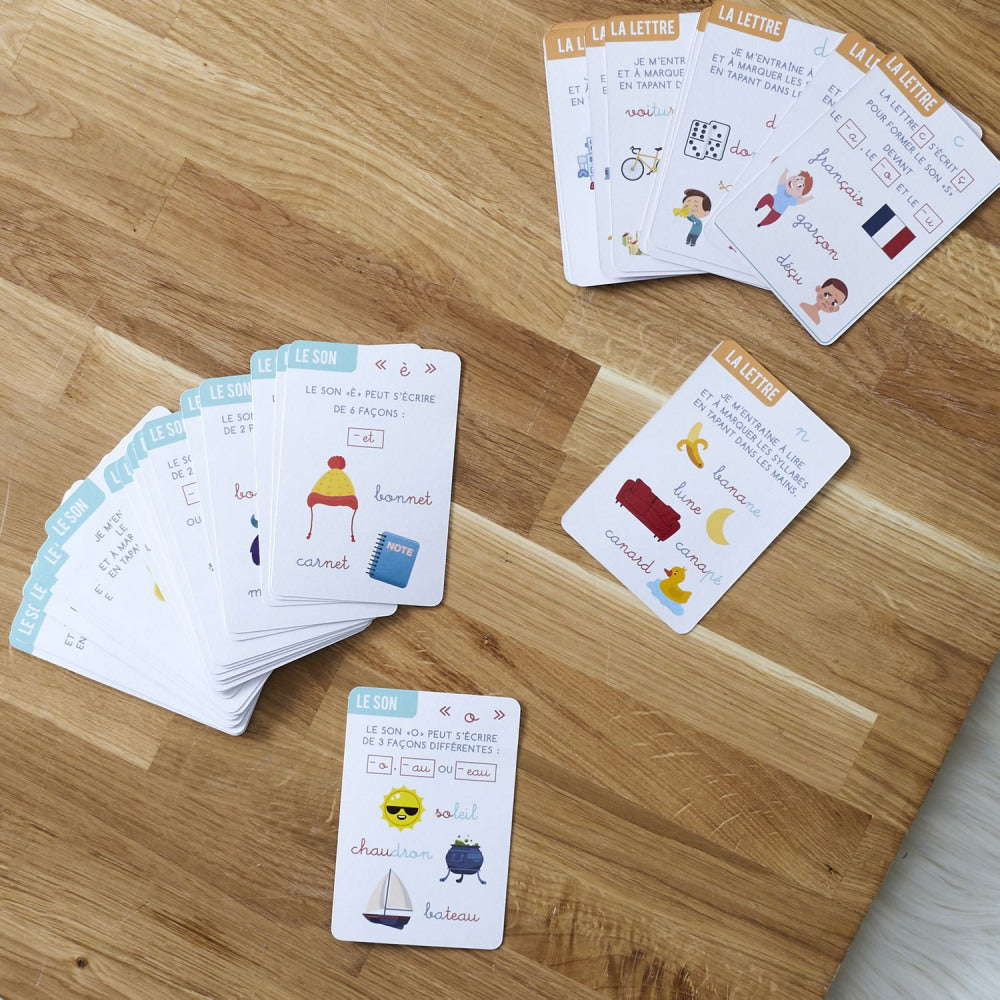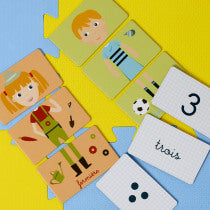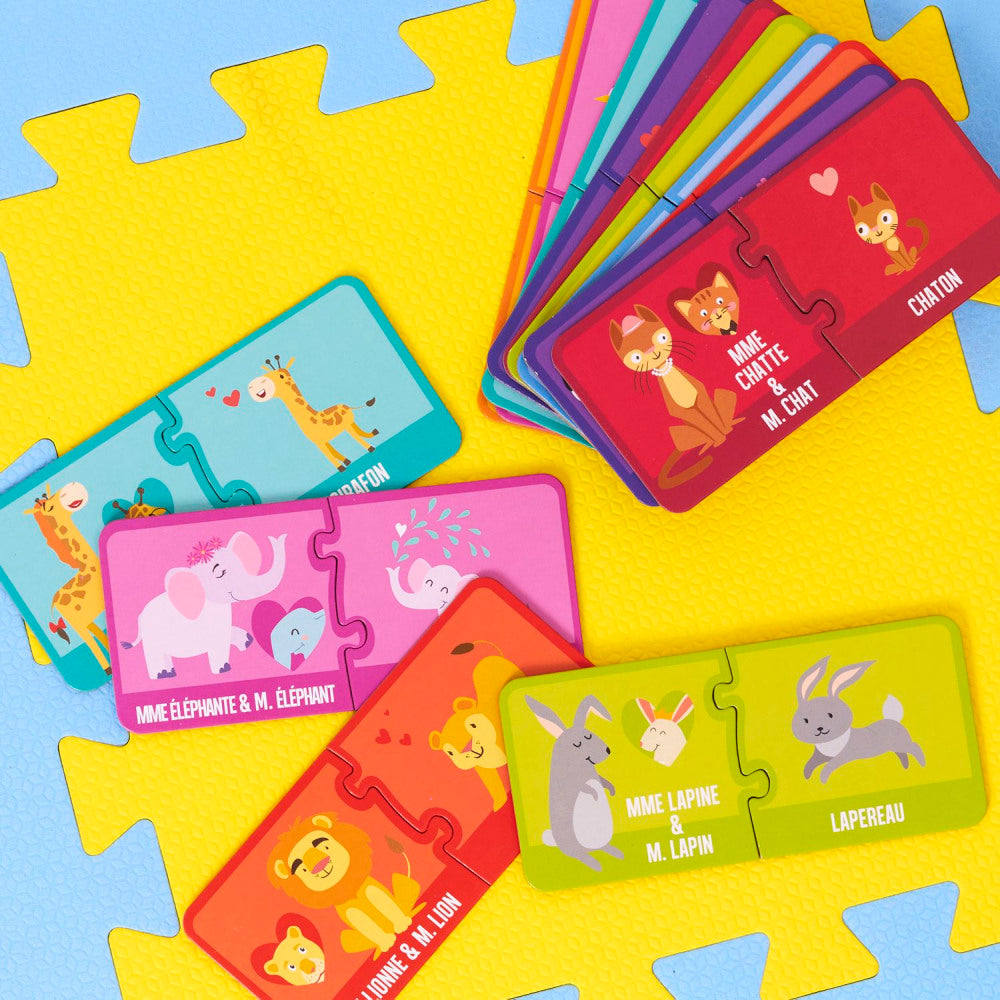Collection: Montessori games
Welcome to our exclusive collection of Montessori games , a meticulous selection designed to awaken every child's curious mind and encourage joyful, independent learning. The Montessori method , founded by Dr. Maria Montessori, is based on the principle that each child is a unique individual with his or her own pace of development. This educational approach , recognized worldwide, promotes independence, respect, natural curiosity, and the development of key skills through exploration and discovery.
-

 Sold out
Sold outMy first activity book 2-4 years old
Vendor:My kiddy ShopRegular price €39,99Regular priceUnit price / per -
Awakening book for children 0-2 years old sea animals
Vendor:My kiddy ShopRegular price €39,95Regular priceUnit price / per -
Activity book for children aged 3-5
Vendor:My kiddy ShopRegular price €39,95Regular priceUnit price / per -
The Kiddy Bear - Dress-up Plush
Vendor:My kiddy ShopRegular price €39,95Regular priceUnit price / per -
Educational cards I learn about monuments
Vendor:2 jeux mômesRegular price €6,95Regular priceUnit price / per -
educational card I learn opposites x30
Vendor:2 jeux mômesRegular price €6,95Regular priceUnit price / per -
Okto Clay DIY 3D Artwork with foam clay, Rabbit
Vendor:Art Bizniz DIYRegular price €24,95Regular priceUnit price / per -
Sensory toy for children, Dino Adventure Park
Vendor:zimpliRegular price €18,90Regular priceUnit price / per -
Sensory Toy for Children, Fantasy Unicorn
Vendor:zimpliRegular price €18,90Regular priceUnit price / per -
Inflatable foot spa at home
Vendor:zimpliRegular price €18,95Regular priceUnit price / per -
Cards to create Diamond horses - CréaLign
Vendor:Créa lignRegular price €18,95Regular priceUnit price / per -
Game I understand Montessori syllables
Vendor:jeux 2 mômesRegular price €6,95Regular priceUnit price / per
-10% on your order!
Subscribe to the newsletter and receive a 10% promo code!
Give a Montessori toy!
Our Montessori games are learning tools designed to stimulate independent learning, encourage creativity, and develop a range of skills . By manipulating real objects and solving problems on their own, children hone their fine motor skills , their hand-eye coordination, their ability to concentrate, and their understanding of the world around them. Each game is an invitation to explore, experiment, and grow, providing children with the foundations needed to become confident, independent learners.
Discover our collection and let Montessori principles transform play into an enriching and meaningful learning adventure for your child.
From discovering shapes and colors to learning numbers and letters, our collection covers all the fundamental aspects of early development. Games include puzzles, educational cards, role plays, and manipulatives that encourage children to explore their environment and learn through direct experience.
PS.: don't hesitate to discover our other creative games and creative hobbies for children !
Your questions about our Montessori games:
How do I choose the Montessori game suited to my child's age?
Choosing the right Montessori game begins by observing the child: their interests, current skills, and challenges. Montessori games are often categorized by age groups , providing a useful first indication. For younger children, choose games that develop fine motor skills and sensory recognition. As the child grows, introduce games that stimulate language, logic, and math skills. The important thing is to choose games that match the child's developmental stage , providing both accessible challenges and successes.
What are the benefits of Montessori games compared to traditional games?
Montessori games are distinguished by their educational approach : they are designed to encourage independent learning, personal discovery, and the development of practical skills. Unlike traditional manual games and creative hobbies for children , which can often be aimed at pure entertainment, Montessori games encourage the child to explore , experiment, and learn through action. They promote concentration, patience, and problem solving, while respecting each child's natural learning rhythm.
How to integrate Montessori games into the child's daily routine?
Integrating Montessori games into the daily routine can be done naturally. Define a quiet and organized play space where the child can concentrate on his activities. Regularly offer them new games to stimulate their interest and engagement. Integrate these games into key times of the day , such as free play in the morning or quieter activities after a nap. Encourage the child to participate in the preparation and tidying up of games, thus reinforcing his sense of order and autonomy.
What advice can you give to cross stitch beginners?
If you 're new to cross-stitch embroidery, start with simple designs and use Aida fabric , which is easy to work with. Take the time to familiarize yourself with the different types of threads and stitches.
Read the instructions that came with your box carefully, and be sure to watch online tutorials for additional guidance.
Remember that patience and practice are essential; don't be discouraged if your first projects aren't perfect.
Can Montessori games be used for children with special needs?
Absolutely . Montessori games can be particularly beneficial for children with special needs. Their sensory and practical approach is ideal for children on the autism spectrum, those with attention disorders, or learning difficulties. These games can be adapted to emphasize certain skills or to introduce concepts at a pace suited to each child. It is often recommended to collaborate with special education professionals to select the most appropriate games and to tailor activities to the child's unique needs.
Tips for using Montessori toys
-

Organization of a Montessori play space:
- Simplicity and order: Create a clean and organized play space. Each game must have its place, thus facilitating access for the child and encouraging autonomy.
- Accessibility: Make sure the games are within reach of the child. Use low shelves where games are visible and easily accessible.
- Safety: Check that the space is secure and appropriate for the child's age. Avoid sharp objects or small detachable parts for younger children.
-

Support for the child:
- Active observation: Observe the child playing without immediately intervening. Let him explore and experiment on his own, only intervening if necessary to guide or encourage.
- Encouragement: Value effort and progress over perfect success. Positive encouragement builds self-confidence and the desire to explore.
- Routine: Integrate Montessori games into the daily routine, dedicating specific moments to playful learning.
-

Combination of games for an enriched experience:
- Variety: Alternate between sensory, cognitive and motor play to stimulate different aspects of child development.
- Themes: Combine games around the same theme (colors, shapes, nature) to deepen learning and create links between concepts.
- Progression: Start with simple games and gradually increase complexity as the child masters basic skills.


























